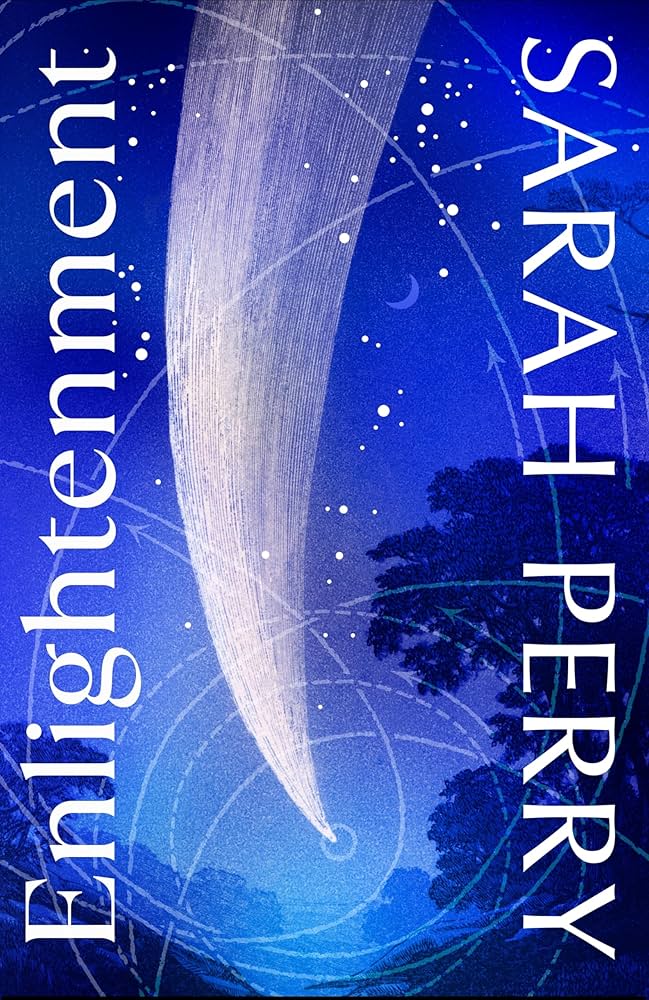October 27, 2024 · 11:48 am
Ruskin Park by Rory Cellan-Jones is the former BBC journalist’s memoir about how his parents met in the 1950s. His mother, Sylvia, was separated from her first husband and worked at the BBC as a secretary. She had a brief affair with James Cellan Jones, a producer who was 15 years her junior. When Sylvia found out she was pregnant at the age of 42, James abandoned her and didn’t meet his son until 23 years later. Two decades after her death in 1996, Cellan-Jones sifted through 60 years’ worth of his mother’s correspondence to piece together what happened at the time of his birth and why. The letters present both a social history of mid 20th-century Britain and a gripping personal story about the challenges of being a single parent in a south London council flat in the 1960s. Readers who enjoy family memoirs in the vein of Romany and Tom by Ben Watt will definitely enjoy ‘Ruskin Park’ which is a moving and compassionately written book.
 Enlightenment by Sarah Perry was longlisted for this year’s Booker Prize. Set in the fictional Essex village of Aldleigh, the novel opens in 1997 when 50-year-old amateur astronomer and newspaper columnist Thomas Hart forges an unlikely friendship with 17-year-old Grace Macauley through a Baptist church. While Grace grapples with her feelings for non-Baptist Nathan, closeted Thomas falls in love with a straight museum curator as they become drawn into the life of Maria Vaduva, a mysterious 19th century astronomer. Whereas The Essex Serpent had a late Victorian setting with a prose style of its time to match, Perry adopts the same 19th century style in ‘Enlightenment’ with only occasional references to its modern setting which gives it a distinctly old-fashioned feel. On a sentence by sentence level, there is some excellent atmospheric writing here which explore themes of science, faith and unrequited love, but the overall plot was too loose for my taste and probably better suited for a reader who prefers more meditative prose. Many thanks to Random House, Vintage Books for sending me a review copy via NetGalley.
Enlightenment by Sarah Perry was longlisted for this year’s Booker Prize. Set in the fictional Essex village of Aldleigh, the novel opens in 1997 when 50-year-old amateur astronomer and newspaper columnist Thomas Hart forges an unlikely friendship with 17-year-old Grace Macauley through a Baptist church. While Grace grapples with her feelings for non-Baptist Nathan, closeted Thomas falls in love with a straight museum curator as they become drawn into the life of Maria Vaduva, a mysterious 19th century astronomer. Whereas The Essex Serpent had a late Victorian setting with a prose style of its time to match, Perry adopts the same 19th century style in ‘Enlightenment’ with only occasional references to its modern setting which gives it a distinctly old-fashioned feel. On a sentence by sentence level, there is some excellent atmospheric writing here which explore themes of science, faith and unrequited love, but the overall plot was too loose for my taste and probably better suited for a reader who prefers more meditative prose. Many thanks to Random House, Vintage Books for sending me a review copy via NetGalley.
 Longlisted for the Baillie Gifford Prize for Non-Fiction last year, Time To Think by Hannah Barnes is about the collapse of the Tavistock Centre’s Gender Identity Development Service (GIDS) for children based in London. When GIDS first opened in 1989, there were only a handful of cases each year for young people questioning their gender identity which were mostly treated through talking therapies to allow “time to think”. Then referrals for puberty blockers and cross-sex hormones increased dramatically, and some staff at GIDS were frozen out for raising concerns about insufficient assessments which overlooked comorbidities, limited clinical evidence and unknown or irreversible side effects with no follow-up in adulthood as well as a toxic management culture in GIDS itself. Barnes is an investigative journalist and covered this story for BBC Newsnight, interviewing former staff and service users about their experiences. The book is meticulously researched and Barnes outlines a catalogue of safeguarding failures with acute awareness of the sensitivity of the topic.
Longlisted for the Baillie Gifford Prize for Non-Fiction last year, Time To Think by Hannah Barnes is about the collapse of the Tavistock Centre’s Gender Identity Development Service (GIDS) for children based in London. When GIDS first opened in 1989, there were only a handful of cases each year for young people questioning their gender identity which were mostly treated through talking therapies to allow “time to think”. Then referrals for puberty blockers and cross-sex hormones increased dramatically, and some staff at GIDS were frozen out for raising concerns about insufficient assessments which overlooked comorbidities, limited clinical evidence and unknown or irreversible side effects with no follow-up in adulthood as well as a toxic management culture in GIDS itself. Barnes is an investigative journalist and covered this story for BBC Newsnight, interviewing former staff and service users about their experiences. The book is meticulously researched and Barnes outlines a catalogue of safeguarding failures with acute awareness of the sensitivity of the topic.
Filed under Books
